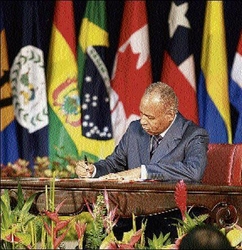Pages
- Home
- About Dr Kris Rampersad
- Kris' Earth Travels
- Courses Workshops & Seminars
- Books & Publishing
- Fiction, Stories & Scripts
- Videos & Productions
- Research & Readings
- Conference Papers
- Contact & Feedback
- Links, Partners & Associates
- Environment Gender & Culture Sensitive Knowledge Research Information Services
- Children's Stories by Dr Kris Rampersad
- Demokrissy
Thursday, September 19, 2019
With BBC gone, who goin' take over town?
 Dr Kris Rampersad is an independent sustainable development strategist, consultant, multistakeholder facilitator, educator & multimedia content creator/innovator. find out more www.krisrampersad.com
Dr Kris Rampersad is an independent sustainable development strategist, consultant, multistakeholder facilitator, educator & multimedia content creator/innovator. find out more www.krisrampersad.com
Wednesday, October 2, 2013
Making local government work
Towards meaningful local government reform
 Talk of proportional representation in the local government system has so far focussed on the political party system, a means of really entrenching the ills of a system that already places too much emphasis on the political party system. There are alternatives for more effective local government reform that would allow local communities ways of more actively getting involved in the running of localised affairs which it might be useful to consider as we talk of local government reform rather than the continued centralisation modes we have been drifting into over the last few decades. Talk of proportional representation in the local government system has so far focussed on the political party system, a means of really entrenching the ills of a system that already places too much emphasis on the political party system. There are alternatives for more effective local government reform that would allow local communities ways of more actively getting involved in the running of localised affairs which it might be useful to consider as we talk of local government reform rather than the continued centralisation modes we have been drifting into over the last few decades.Visit Demokrissy's New Home: The GloCal Knowledge Pot |
 Dr Kris Rampersad is an independent sustainable development strategist, consultant, multistakeholder facilitator, educator & multimedia content creator/innovator. find out more www.krisrampersad.com
Dr Kris Rampersad is an independent sustainable development strategist, consultant, multistakeholder facilitator, educator & multimedia content creator/innovator. find out more www.krisrampersad.com
Wednesday, August 22, 2012
Diversity and culture of Ministries
• Attitudes of selfishness, lawlessness, greed, dishonesty, indifference to others.
• Violent manifestations in the home, community, workplace, language of leadership, music.
• Tendency to describe ourselves through notorious deeds.
• Negative “languaging” of our space.
 Dr Kris Rampersad is an independent sustainable development strategist, consultant, multistakeholder facilitator, educator & multimedia content creator/innovator. find out more www.krisrampersad.com
Dr Kris Rampersad is an independent sustainable development strategist, consultant, multistakeholder facilitator, educator & multimedia content creator/innovator. find out more www.krisrampersad.com
Sunday, July 25, 2010
Groups question success of Trinidad summit -
Published: Wednesday | April 22, 2009

Trinidad and Tobago's Prime Minister Patrick Manning signs the final declaration of the fifth Summit of the Americas in Port-of-Spain, Trinidad and Tobago, Sunday, April 19. Manning was the sole signatory. The confab of 34 heads of government from within the hemisphere was overshadowed by Cuba, and Hugo Chávez, who grabbed centre stage with the unexpected presentation of a book to United States President Barack Obama that detailed Latin America's beef with the superpower over many decades.
News reports highlighted the erection of a new wall that did not entirely block the urban blight of Port-of-Spain, others wondered where was the beach amid organisational glitches at the fifth Summit of the Americas.
Now civil society groups in the Americas said Tuesday they were still awaiting the promised action and implementation plan that was supposed to have emerged from the Fifth Summit of the Americas and the Port-of-Spain Declaration.
Sole signatory
Trinidad's Patrick Manning was the sole signatory to the declaration.
The Active Democracy Network (ADN), whose membership spans 24 countries said it had expected more of a commitment on a number of issues including poverty alleviation from the western hemispheric leaders.
"In the areas where we expected assigned deadlines and responsibilities, the Summit merely adopts UN deadline of 2015 for the alleviation of poverty and achievement of the Millennium Development Goals at a time when the UN is itself reviewing that deadline - just five years away," said ADN spokesperson Dr Kris Rampersad.
Strategic actions

"The only clauses that assert accountability from governments are Clause 66, which merely 'instructs' governments to meet again in 2010 on the Inter-American Program for Sustainable Development (PIDS); Clause 90, which calls on 'the technical secretariats of all Inter-American Ministerial Meetings to inform their ministers and high level authorities of the mandates arising from this summit and to initiate strategic actions, by the end of 2009, to facilitate the implementation of our commitments."
Clause 99 instructs ministers of finance or pertinent authorities to convene a meeting in 2010 to address regional financial and economic issues.
But: "Will the financial and economic crisis wait until we reach to Clause 99 and 2010?," said Rampersad, reeling off a series of questions on the action plan post summit, Caribbean priorities, and solutions and projects identified for food, energy and environmental crises.
97 new commitments
"These are questions that remain unanswered in the Declaration. In essence, it implies that we seem to have held a Summit to instruct all attending to commit to meet again," said Rampersad.
The Port-of-Spain Declaration, she said, was no different than the some 634 mandates and commitments that governments of the region have signed on to over the last four summits, on which some 60 per cent of the governments have taken no action.
"This Summit, in fact, adds 97 more commitments to the 634 others, while leaving open the questions of who is going to implement them, given the token signing of the declaration by the Chair, Prime Minister Patrick Manning, seemingly on behalf of the meeting," said Rampersad.
- CMC
 Dr Kris Rampersad is an independent sustainable development strategist, consultant, multistakeholder facilitator, educator & multimedia content creator/innovator. find out more www.krisrampersad.com
Dr Kris Rampersad is an independent sustainable development strategist, consultant, multistakeholder facilitator, educator & multimedia content creator/innovator. find out more www.krisrampersad.com
Tuesday, June 15, 2010
Political parties should discuss women issues during campaign
Grow Safeguard Preserve Create A MultiMedia Legacy
With rapidly changing technologies in media, many of our knowledge resources are fast disappearing or becoming inaccessible. We are in the process of digitising our archives representing more than 30 years of contemporary Caribbean development linked to more than 10,000 years of regional pre and post colonial history and heritage. Make contact.
To support, sponsor, collaborate and partners with our digitisation efforts. Or to develop your own legacy initiatives, and safeguard, preserve, multimedia museum, galleries, archives, make contact.
 Dr Kris Rampersad is an independent sustainable development strategist, consultant, multistakeholder facilitator, educator & multimedia content creator/innovator. find out more www.krisrampersad.com
Dr Kris Rampersad is an independent sustainable development strategist, consultant, multistakeholder facilitator, educator & multimedia content creator/innovator. find out more www.krisrampersad.com
Victory for ships’ owners
 Dr Kris Rampersad is an independent sustainable development strategist, consultant, multistakeholder facilitator, educator & multimedia content creator/innovator. find out more www.krisrampersad.com
Dr Kris Rampersad is an independent sustainable development strategist, consultant, multistakeholder facilitator, educator & multimedia content creator/innovator. find out more www.krisrampersad.com
Featured Post
Borne out of the still bellowing black smoke of insurrection that had split the nation wide open along all its fractured fault lines see...



